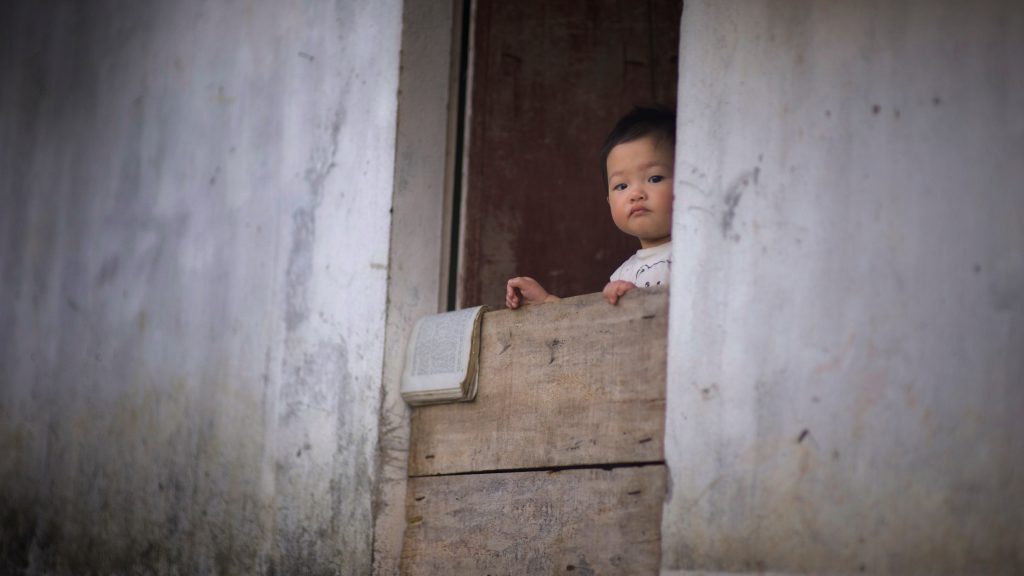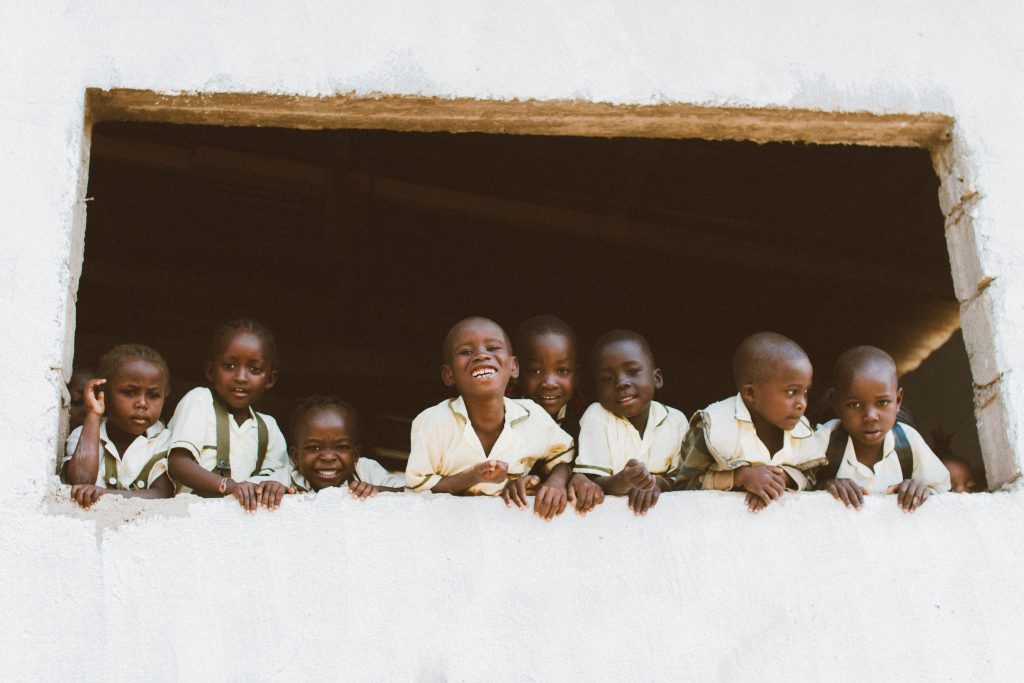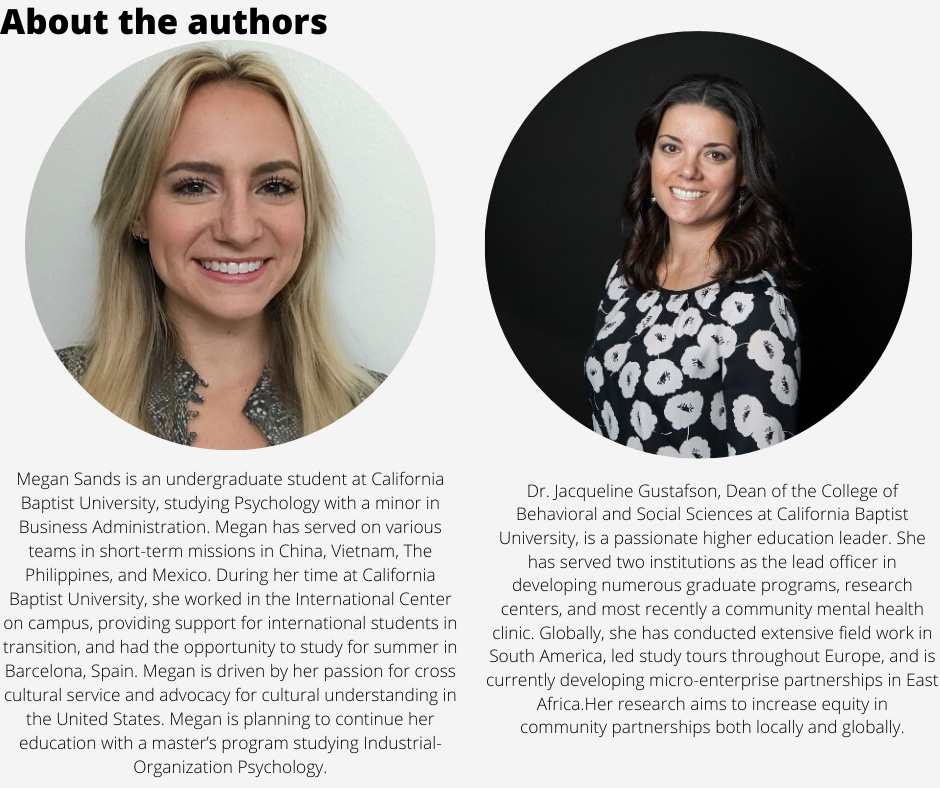“Helping or Hurting? Considering the Lasting Impact of Short Term Missions”
By Megan Sands and Dr. Jacqueline Gustafson, EdD

You hop off the plane full of wonder and excitement, eager to change the world. Everything around you feels beautifully unfamiliar; the different smells, language, and horizons draw you in. You look out the window and see the children running towards the car, laughing and grinning ear to ear. They have been awaiting your arrival. For the next several weeks you play, sing, and dance, bringing joy to so many faces. You connect with the people and the culture in an inexplicable way until the van returns to take you home. You’ve been forever changed by the things you saw and the people you served, ready to share your story, to tell the world what this has meant to you. You post about it on Instagram, you share your stories with family and friends. In quiet moments, your thoughts wander, filled with hope that you might one day visit again. But what fills the daydreams of the children in this story? What are their hopes and dreams? Do they dream of the day when you will visit again? Or, possibly another team? Or, maybe they dream about the day when they might get to ride away….
Have you participated in short term mission or service trips? We hope that you have, because it can be an amazing experience for both those serving and those being served! What about the moments and days after the trip? Your world was likely impacted in so many ways. What is often not considered is the way in which those whom we serve, or host communities, are truly impacted by our service, interaction, and presence. Serious consequences can follow our exciting short term visits. A rise in “volunteer tourism” presents concerns of very possible dependency and exploitation of host communities (Hartman et al., 2014). Hartman et al. noted that popularity in these international short term service programs has created a market of selling these experiences as a commodity.

Certainly the intent of such trips, in a variety of different forms, is “doing good.” However, unfortunately some challenges can occur when acts of service are seen as “unquestioned good.” Some responses suggest that the risk to host communities is simply too great, no matter how well intentioned. While others argue against these concerns with the attitude that “at least we care,” “we are doing something, what are you doing?” or “at least we are trying to help.” So what’s the right response? Is there a space for short-term service and engagement? Can the goals of service be advanced while also safeguarding against risks to vulnerable populations?
In response to the concern of protecting vulnerable populations, Dr. Jacqueline Gustafson (CBU), Dr. Amanda Howard (Samford University), and Nicole Wilke (Christian Alliance for Orphans) have developed Principles and Practices for Just Engagement: An Evidence Based Curriculum for Short Term Missions and Service with Orphans and Vulnerable Populations. This online curriculum combines scientifically-informed guidelines for and alternate models of best practices in engagement. The mission of the project seeks to provide access for churches, nonprofits, and university-based programs to educate service providers and reduce risk for host populations. The curriculum provides an alternative perspective and approach to short term service and mission work.

Photo by frank mckenna on Unsplash 
Photo by Adrianna Van Groningen on Unsplash
The project seeks to bring awareness to, and advocate for, best practices in short-term volunteer projects serving orphans and other vulnerable populations. Like the introductory story shows, service can connect people, promote cultural understanding, and improve host communities’ quality of life. The project includes developing and deploying a free online evidence-based curriculum for short-term missions and service intended to benefit orphans and vulnerable populations. Expert opinions have been collected on best practices in their respective fields and experiences. Researchers, church leaders, and nonprofit organizational leaders who have participated in short term missions and service projects speak on various topics to build this curriculum. Ethical considerations are addressed by the experienced individuals in interactive modules to better prepare teams for service. Some important ideas taught in this curriculum include vulnerable populations, cultural humility, child protection, impact and evaluation, media/ethical storytelling, and alternative engagement. We hope to educate and challenge well-intentioned service teams to do the most good in the most ethical way.
What are your thoughts? Share below; we would love to hear from you!

References:
Hartman, Eric, et al. “Fair Trade Learning: Ethical Standards for Community-Engaged International Volunteer Tourism.” Tourism and Hospitality Research, vol. 14, no. 1-2, 2014, pp. 108–116., doi:10.1177/1467358414529443.
Resources:
Fair Trade Principles and Rubric for University Administrators and Faculty: https://compact.org/ftl/
Working with Vulnerable Children: https://cafo.org/ovc/
Short-Term Missions: https://cafo.org/ovc/missions/
Faith to Action (n.d.) Short Term Missions: Guidance to Support Orphans and Vulnerable Children: https://www.faithtoaction.org/wp-content/uploads/Short_Term_Missions_Guidance_Support_Orphans_Vulnerable_Children.pdf
Ethical Short Term Missions & Volunteering (n.d.): https://ethicalmissionstrips.org/ethicalframework
7 Comments
Thank you for shedding light on an area that is not talked about enough. I was completely unprepared for my service trip to Uganda and come home left to wrestle with the mixed feelings I had. Although grateful for the opportunity and hopeful that I made an impact, I also felt like I was perpetuating a colonialist missionary mentality. I found myself in Uganda handing out reading glasses wondering “why am I doing this FOR these people instead of working WITH local leaders who are the experts in their own community”. After returning home I read a book called Slow Kingdom Coming that addresses the potential danger of short term missions and “missionary tourism” that I found helpful. I look forward to reviewing this evidence based resource you all have developed. Thank you!
Thanks, Dr. Hays, for sharing your thoughts and personal experience. I think it’s so important to be intentional as we think about how best to fulfill the Great Commission!
Dr. Smith, Thank you for putting this more into perspective. Many times we find ourselves flooded with excuses as to why we cannot serve but this post shows the possibilities of what short-term missions can accomplish and what more there is behind them. I really enjoyed reading this post because now I have more of a perspective of what these missions stand for.
Thank you for sharing your thoughts and some research associated with short term missions. We should all think about the long term impact of this fun and inspirational trips. If they are not doing any good for the community then we as Christians should rethink our motives. Thank you for bringing awareness to an important issue that is not often known.
I really enjoyed reading this blog on mission trips and the impact they have. I have always wanted to go on a mission trip because of my intent of making a difference and to leave wanting to continue to do more. I would hate to just leave that trip and look at it as just an experience I had. I would want to leave the trip knowing that from that day forward I will continue to do more outside of that trip. I hope this blog teaches others to continue to do more after their trip and keeping their experience in their mind rather than in the past.
Such an important area of consideration! I, too, have noticed a growing distaste for short-term mission trips in the media, particularly because of the potential for exploitation that churches might unintentionally enact upon their host communities. By bringing awareness to positions of privilege that the church holds when visiting international communities in need, we strive towards giving these communities the respect that they deserve. Thank you so much for the insightful discussion and these resources!
This was a wonderful blog! I have never been on a missions trip, but I have a sister who has been on many missions trips. I love hearing the stories she brings back home about women and children and how lives were given to the Lord. Not only that, but hearing the friendships she makes and in a way bringing hope to the woman and children she had worked with. I have never thought about how this can leave a short-term impact and once you leave you only had an experience. I hope to one day go on a missions trip but continue on after the trip helping and contributing to missions. Thank you for this and for putting it into a different perspective!